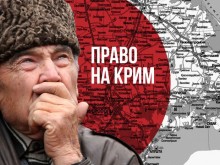On March 28, Den will launch special project “Whose Crimea?” (English version will be available in April on our website). It is a series of current interest articles by Candidate of Sciences (History), Senior Research Fellow of the National Academy of Sciences of Ukraine’s Krypiakevych Institute of Ukrainian Studies Yurii Zaitsev. They cover a burning topic: who has, in fact, historic rights to the peninsula?
“Unprovoked aggression of ‘brotherly Russian’ army and navy in Crimea, committed under the pretext of protecting ethnic Russians from the mythical Banderites, has once again stimulated discussion of the political status of the peninsula and efforts to determine how valid are claims of different ethnic groups, including the Crimean Tatars, Russians or Ukrainians to be the rightful owners of this blessed land. To clarify the issue, we will have to immerse ourselves in both distant and recent history of the region,” historian Zaitsev wrote in the introduction to his study. He then added: “Historical retrospective shows clear superiority of the Crimean Tatar claim in that triangle.”
The articles will cover the formation of the Crimean Tatar ethnic group which began as early as the 13th century due to the conquest of the steppe Crimea by Batu Khan’s armies in 1239; the introduction of Islam as the state religion in the 14th century; the emergence of the Crimean Khanate, the independent Crimean Tatar state, following the collapse of the Golden Horde in 1443, and many other interesting historical details, put into the context of current events. In fact, we will offer our readers a sort of scholarly and journalistic crash course on the history of Crimea from antiquity to the present. A special place in the story will be allocated to the peninsula’s unique flourishing of culture, arts, architecture, literature, education, and local traditions. Read it all on Den’s website.







